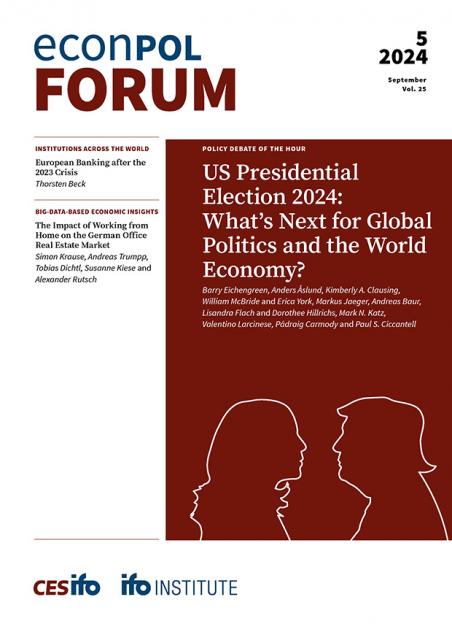US Presidential Election 2024: What’s Next for Global Politics and the World Economy?
Articles included
POLICY DEBATE OF THE HOUR
Introduction to the Issue on US Presidential Election 2024: What’s Next for Global Politics and the World Economy?
Chang Woon Nam
EconPol Forum 25 (5), 03-04
The Economic Policies of the Next US President
Barry Eichengreen
EconPol Forum 25 (5), 05-08
What to Expect from US Economic Policy after the Presidential Election
Anders Aslund
EconPol Forum 25 (5), 09-12
US Presidential Election 2024: Consequences for Fiscal Policy
Kimberly A. Clausing
EconPol Forum 25 (5), 13-17
US Presidential Election 2024: A Comparison of Fiscal Policies Proposed by Leading Candidates for US President
William McBride and Erica York
EconPol Forum 25 (5), 18-21
Foreign Economic and Macro Policies after the US Presidential Election
Markus Jaeger
EconPol Forum 25 (5), 22-26
German-US Trade Relations before the Election: Implications of a Trump Comeback
Andreas Baur, Lisandra Flach and Dorothee Hillrichs
EconPol Forum 25 (5), 27-31
What Difference Will It Make? Impact of a Harris or Trump Presidency on American Foreign Policy
Mark N. Katz
EconPol Forum 25 (5), 32-35
On the Growing Dangers of Money in American Democracy
Valentino Larcinese
EconPol Forum 25 (5), 36-40
The 2024 Presidential Election in the US: Potential Impacts on Global Politics and Economics
Pádraig Carmody and Paul S. Ciccantell
EconPol Forum 25 (5), 41-47
INSTITUTIONS ACROSS THE WORLD
European Banking after the 2023 Crisis
Thorsten Beck
EconPol Forum 25 (5), 48-51
BIG DATA-BASED ECONOMIC INSIGHTS
The Impact of Working from Home on the German Office Real Estate Market
Simon Krause, Andreas Trumpp, Tobias Dichtl, Susanne Kiese and Alexander Rutsch
EconPol Forum 25 (5), 52-59
On November 5 of this year, American voters will have a choice between former Republican President Donald Trump and Vice President Kamala Harris, who was named the Democratic nominee after President Joe Biden’s decision not to run for the presidency again. A record number of countries are holding elections this year, but this US presidential election is likely to be one of the most important due to the country’s influence on the global stage. Although the world is currently suffering from wars, rising tensions between major powers, and other geopolitical risks, most of these have not radically affected the outlook for economies and markets in the short term. However, many fear that this could change if the US returns to an aggressive “America First” stance. On the other hand, Harris is seen as the candidate of political continuity who will maintain many of Biden’s economic and foreign policy measures.
Domestically, Mr. Biden has increased investment in infrastructure and manufacturing, clean energy, and expanding job opportunities as part of “Bidenomics,” which has led to strong growth during his presidency, but also to inflation and rising government debt. Mr. Trump, in turn, has blamed his successor’s huge government spending for inflation and promised a return to lower taxes and less regulation. Aside from such differences in the fiscal policy priorities of the two candidates, of which change could also have multiple cross-border spillover effects, the 2024 US elections are seen more than ever as a pivotal moment in global politics and have the great potential to reshape international trade, climate policy, and the geopolitical landscape.
“US Presidential Election 2024: What’s Next for Global Politics and the World Economy?” EconPol Forum 25 (5), CESifo, Munich, 2024.
